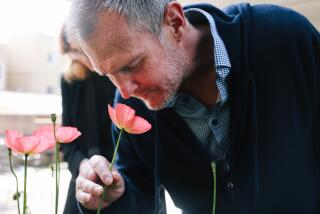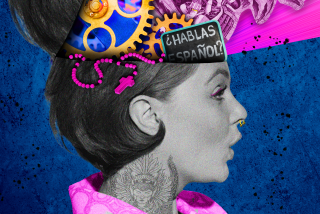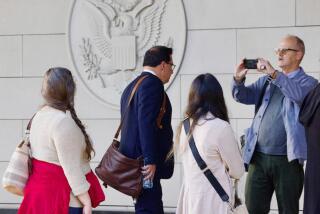Luis J. Rodriguez wrestles his demons in ‘It Calls You Back’
Luis J. Rodríguez has been called “a superhero in Chicano literature” for his steady output of poems, fiction and above all for “Always Running,” his classic 1993 memoir about jettisoning his former life as an East L.A. gangbanger.
The Dalai Lama once praised him as an “unsung hero of compassion.” His old friend John Densmore, drummer for the Doors, describes him as a curandero, the term for a traditional Mexican healer who ministers to his community’s wounds.
But over lunch recently in a northeast San Fernando Valley strip mall, Rodríguez offered a far more mixed self-appraisal. He’s especially severe in grading himself as a parent to his eldest son, Ramiro, who was released from prison in July 2010 after serving 13 1/2 years for attempted murder.
Rodríguez wrote “Always Running” as a first-person cautionary tale, hoping to prevent young men like Ramiro from throwing away their lives. His follow-up confessional, “It Calls You Back,” published last fall and a finalist for this year’s National Book Critics Circle Awards, is an eloquent, emotionally blunt-edged reckoning with his life before and after the events chronicled in “Always Running.”
“I’m not like this guy looking from the outside, judging everybody’s actions,” Rodríguez said. He acknowledges that his latest book goes hard on a number of people including his late father, who’s accused of being a pedophile, the author’s first wife, Camila, and their son Ramiro. But he reserves his stiffest verbal punches for himself.
“My actions contributed in some way to how people were the way they were. So it really is about me and my changes, my struggles, my decisions, my failures, my doubts. I made mistakes as a father. I have to be the first one to cop to it.”
Now a distinguished-looking 57-year-old grandfather with a silvery goatee and a companionable paunch, Rodríguez resembles a college English professor more than the hard-bodied Whittier Boulevard punk he used to be. The only telltale mark is his jutting bulldog chin, the result of a fractured jaw sustained in a grade-school dust-up.
Recognized internationally as an expert on youth culture and adolescent criminality, he has spoken to thousands of teachers, law enforcers, social workers, community organizers, union officials, journalists, prison inmates and juvenile detention facility wards, who are eager to absorb his painfully acquired insights. He spends large chunks of each year traveling the world, giving talks and readings, appearing on panels and preaching to kids like himself to stay off drugs, out of gangs and in school.
An honest accounting
He continually draws on the life lessons he recounts in “Always Running,” a book that has been likened to a Mexican American version of “The Autobiography of Malcolm X” and has sold some 450,000 copies. But despite the many miles he has logged since his days as a Brown Beret and Cal State L.A. broadcast journalism student, Rodríguez still can feel the dark undertow of addiction and violence, threatening to pull him into its vortex if his vigilance ever falters again.
Even years after he quit the gang life, he said, “I still carried some of those attitudes, the way I dealt with my relationships, very brusque and very mean,” he said. “I found myself still traumatized even though I had left that, and it was still calling me.”
In his latest memoir, Rodríguez writes with pained candor and not a flicker of self-pity about his infidelities and his battles with alcohol and heroin, and how his absenteeism contributed to his son’s descent into the gang life. What he metaphorically calls his son Ramiro’s “drowning” forced Rodríguez to confront his own parental lapses.
“I had been a cowardly father, a scared father, a drunk father,” he writes, “and even when I was okay, when I was just a dad who hugged and played with his kids, it was with the backdrop of absence, being too busy, unavailable. In a weird way I became my dad.” Even after “Always Running” was published, and he was being feted on “The Oprah Winfrey Show,” performing slam poetry in Berlin and counseling members of the fearsome Mara Salvatrucha gang in El Salvador, his family life was in danger of imploding.
For the time being, at least, a potentially tragic ending to this story has been averted. After suffering a series of health scares last year, Rodríguez, who has been clean and sober since 1993, said he’s now taking better care of himself.
Just as important, he and his son are reconciled. Speaking by phone from his home in suburban Chicago last week, Ramiro Rodríguez said he has pulled his life together since leaving prison. He’s pursuing a college degree, working with youth leadership counseling and violence-prevention groups and engaged to be married.
“Before I went to prison, my relationship with my father was kind of rocky and not good, but through my imprisonment we got a lot closer,” Ramiro said. “I’m following in his footsteps and dedicating myself to youth.”
Family secrets
Less harmonious was the reaction of Luis Rodríguez’s siblings to his disclosures about their father’s alleged serial molestings. His father’s victims, he said, included one of Rodríguez’s daughters, a niece of Rodríguez’s and possibly one of Rodríguez’s sisters. “I went morose, then hard, then crazy,” he recalls in “It Calls You Back.” “I wanted to kill my dad.”
To prepare his relatives for the new book’s publication, Rodríguez called a private family meeting. His eldest half-sister surprised him by telling him, “You were very courageous for doing this.” But others felt angry and embarrassed that he was publicly airing their laundry.
“I feel bad about that, because you don’t want to do that to your family,” Rodríguez said. “I have two responsibilities. One is to tell the truth. Two, how I tell it: Can I do it with some dignity? I didn’t want to make my dad a monster. Because most of these guys aren’t monsters; they’re guys who generally you love, and then they do things to you.”
Densmore, who has known Rodríguez for years, said that his friend tends to “flog” himself for his perceived shortcomings. But having dealt with some of his own family secrets in his autobiography “Riders on the Storm,” Densmore believes that Rodríguez’s full disclosure can help readers grapple with their own demons.
“Reading the book [“It Calls You Back”], it’s so brutally honest that you love him and you love Ramiro and you pray for everyone in this book,” said the musician, who has hosted benefits for Tía Chucha’s, the Sylmar-based cultural center and bookstore that Rodríguez and his wife Trini and brother-in-law Enrique Sanchez operate, along with their publishing company, Tía Chucha Press.
Rodríguez said he’d never planned to write a second memoir after “Always Running.” But once he set himself to the task, he ended up with 800 manuscript pages that he eventually trimmed to about 320. The book is selling “pretty well but I’m sure it’s not selling what it should be selling,” he said, adding that he doesn’t know what the current sales figures are.
He thinks one problem with “Always Running” is that its triumph-over-adversity story line created a heroic image of him that he didn’t intend. “I’m not really a big hero; I’ve been very lucky. I did make some choices that I think were good choices — getting out of the gang, getting out of drugs. But on the other hand I was also very fortunate. I should’ve been dead like my homies, but I wasn’t.”
Although he has no designs on a third memoir, he knows the subject will stay relevant as long as “we’ve got all these kids that are falling in the same traps.”
“One time I told somebody I wish ‘Running’ could be obsolete, that it just becomes a story that nobody wants because nobody’s going through this.”
More to Read
The biggest entertainment stories
Get our big stories about Hollywood, film, television, music, arts, culture and more right in your inbox as soon as they publish.
You may occasionally receive promotional content from the Los Angeles Times.







